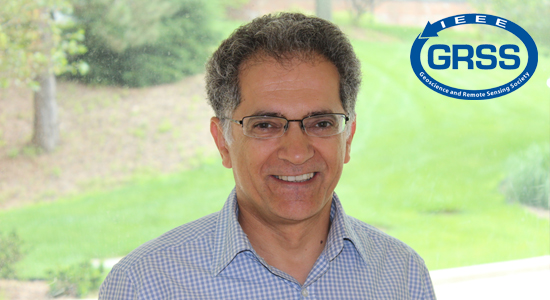Kamal Sarabandi elected President of IEEE Geoscience and Remote Sensing Society
The IEEE Geoscience and Remote Sensing Society is a remote sensing organization with more than 3700 members around the globe.

 Enlarge
Enlarge
Kamal Sarabandi, Rufus S. Teesdale Professor of Engineering, has been elected president of the IEEE Geoscience and Remote Sensing Society (GRSS). He will begin his two-year term January 1, 2015.
The IEEE Geoscience and Remote Sensing Society (GRSS) is a worldwide premier remote sensing professional organization with more 3700 members throughout the globe. The IEEE GRSS strives to continue being the leading society in science, engineering, applications, and education for the remote sensing and geospatial information community.
The fields of interest of the GRS Society are the theory, concepts, and techniques of science and engineering as they apply to the remote sensing of the earth, oceans, atmosphere, and space, as well as the processing, interpretation and dissemination of this information.
Professor Sarabandi has been engaged with the IEEE GRSS for many years and held various leadership positions, such as vice president for Professional Activities and Executive Vice President.
“It is an honor to lead such a prestigious organization as its president for the next two years,” said Prof. Sarabandi.
Prof. Sarabandi’s research encompasses a wide range of topics in the area of applied electromagnetics, specifically: microwave and millimeter-wave radar remote sensing; antenna miniaturization and reconfigurable antennas for wireless applications; wireless channel characterization for performance assessment of wireless systems; and millimeter-wave and submillimeter-wave subsystems and components with applications to radar imaging (collision avoidance, autonomous vehicle control, security, etc.). His work in these areas spans more than 30 years.
Last year, Prof. Sarabandi made several major headlines for his work with the US Department of Defense on a concealed gun detection radar.
Prof. Sarabandi is director of the Radiation Laboratory and director of the Center for Objective Microelectronics and Biomimetic Advanced Sensors. He is also a founding editor of Geoscience and Remote Sensing Techniques and Applications.
He has received numerous awards for his efforts both as an educator and researcher, including the IEEE GRSS Education Award, the IEEE GRSS Distinguished Achivement Award, and the IEEE Judith A. Resnik Award for outstanding contributions to space engineering, the Humboldt Research Award, and a NASA Certificate of Appreciation. At Michigan, he has received numerous awards for teaching and research, including the Henry Russel Award and the U-M Distinguished Faculty Achievement Award.
Prof. Sarabandi has authored 8 patents in the area of antenna design. He has received 25 paper awards together with his students, graduated more than 43 Ph.D. students, and currently leads a research group of more than a dozen graduate students. He has been the PI for more than 90 externally funded projects totaling more than $40M.
Read more about Prof. Sarabandi’s research and honors
 MENU
MENU 
